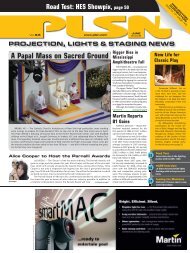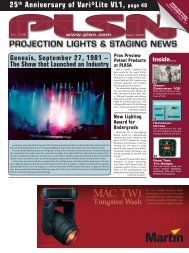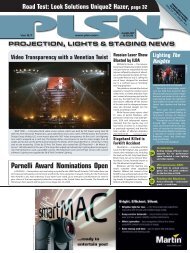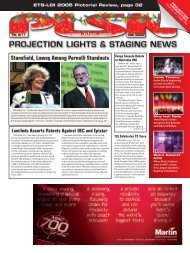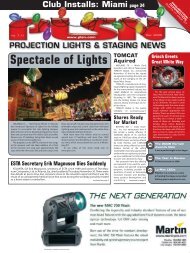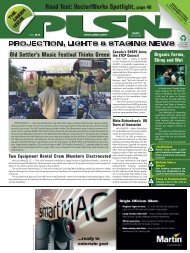Download a PDF - PLSN.com
Download a PDF - PLSN.com
Download a PDF - PLSN.com
You also want an ePaper? Increase the reach of your titles
YUMPU automatically turns print PDFs into web optimized ePapers that Google loves.
FEEDING THE MACHINES<br />
P R O J E C T I O N L I G H T S & S TA G I N G N E W S<br />
By BradSchiller<br />
The Grand Poobah of the Console<br />
Fred Flintstone was a member of the<br />
Loyal Order of Water Buffaloes Lodge<br />
#26 and was continually trying to<br />
gain leader status of this group by be<strong>com</strong>ing<br />
the “Grand Poobah.” This high-ranking<br />
position would have allowed him to rule<br />
over all others and reign supreme over<br />
the group’s members. Much in the same<br />
manner, the grand master on your lighting<br />
console rules over all other masters and<br />
has supreme control over the intensities of<br />
your fixtures. Believe it or not, this slider<br />
and its associated DBO (Dead Black Out)<br />
button can be extremely useful during the<br />
programming and playback of automated<br />
lighting.<br />
How It Works<br />
plsn<br />
The grand master behaves in the same<br />
manner on most lighting consoles (but always<br />
consult your manual to understand<br />
how it operates on your console). Generally,<br />
the grand master adjusts the highest<br />
possible intensity for all fixtures. When<br />
the grand master is at 100 percent, then<br />
all fixtures can achieve 100 percent intensity<br />
if programmed to do so. However<br />
if the grand master is at 50 percent, then<br />
all programmed intensities will be half of<br />
their programmed values. For instance, a<br />
programmed value of 80 percent will be<strong>com</strong>e<br />
40 percent when the grand master<br />
is at half.<br />
The grand master has great control<br />
over intensities <strong>com</strong>ing from most elements<br />
of the lighting console. This means<br />
that it not only takes effect on other playbacks,<br />
but also on data in your programmer<br />
or editor. In addition, the grand master<br />
will not affect values that are parked,<br />
nor will it affect RGB LED fixtures (unless<br />
it has a virtual intensity value). Remember<br />
also that the grand master only limits intensity<br />
values at the output; none of your<br />
data is actually changed.<br />
Most consoles also have a DBO button<br />
associated with the grand master. This<br />
button may be momentary or it may lock<br />
on. When activated, it will instantly bring<br />
all intensities to zero until it is released or<br />
activated again. Most consoles have LED<br />
or on-screen level indicators for the grand<br />
master and the DBO state. Usually the<br />
LEDs will flash if the grand master is not<br />
at 100 percent, because in most circumstances,<br />
you want it at 100 percent nearly<br />
all of the time.<br />
Generally, the grand master adjusts the<br />
highest possible intensity for all fixtures.<br />
The Biggest Mistake<br />
plsn<br />
At some point in everyone’s lighting<br />
career, they will find themselves sitting at<br />
a lighting console not able to figure out<br />
why there is no output from the desk. You<br />
will troubleshoot for minutes or hours trying<br />
to determine why nothing is <strong>com</strong>ing<br />
up. Eventually you look across your desk<br />
and realize the grand master is at zero.<br />
Don’t worry, this happens to everyone at<br />
least once! (Guilty! —ed.)<br />
The grand master can be very useful to<br />
ensure that the lights are not used by others<br />
who do not understand the console.<br />
For example, if you need to walk away from<br />
the desk for a period of time, you might<br />
leave the grand master at zero so that others<br />
who get button happy do not end up<br />
turning on fixtures. When you return, however,<br />
you must remember the level of the<br />
grand master; otherwise you will be<strong>com</strong>e<br />
confused by no console output.<br />
A Very Special Fader<br />
plsn<br />
What makes the grand master so special?<br />
At any time, I can reach over and <strong>com</strong>pletely<br />
dim out all the intensities of my<br />
lights. I have been on productions where<br />
the director was asking about a light spill<br />
rig without having to create a special button<br />
to do so. However, I must be conscious<br />
of the fact that the grand master controls<br />
all intensities on the desk. So this means<br />
that any media servers, smoke machines,<br />
non-dims, etc., will also be turning on and<br />
off. In some cases, use of the grand master<br />
may not be desirable simply because it<br />
does control all fixtures in the desk.<br />
I was once programming a show for an<br />
LD and during a performance he began<br />
flashing the DBO to the beat. Suddenly he<br />
looked at me and yelled for help because<br />
he had managed to mash the button into<br />
the desk, locking it in permanent blackout!<br />
I had to quickly decide if I was going<br />
to switch to the backup console or see if I<br />
could pry the button loose. Luckily there<br />
were followspots illuminating the band<br />
and I was able to pry the button loose<br />
within a few seconds, like MacGyver, with<br />
my Swiss Army knife.<br />
What makes the grand master so special?<br />
At any time I can reach over and <strong>com</strong>pletely<br />
dim out all the intensities of my lights.<br />
and I could quickly bring down the grand<br />
master to prove it was not <strong>com</strong>ing from<br />
my desk. Or I can use the grand master to<br />
lower the output to provide better lighting<br />
for a television camera. I also have<br />
brought down the grand master when the<br />
LD wanted to see only the followspots, or<br />
the rehearsal had ended.<br />
The point is that the quick ease of<br />
blacking out or dimming down at any<br />
given moment provides extreme power<br />
without having to determine what to dim.<br />
If during a rehearsal a band stops playing<br />
mid-song and the lights are strobing<br />
in their eyes, I can quickly dim this look<br />
without losing my place in the playback.<br />
Then when they are ready to continue, I<br />
can bring the grand master back up and<br />
continue.<br />
Let’s Go Live<br />
plsn<br />
In a live show, when playing back onthe-fly<br />
(busking, winging it, or punting), I<br />
find using the grand master and DBO button<br />
very helpful. I will often ride the grand<br />
master fader up and down with the beat of<br />
the song or flash the DBO key accordingly.<br />
By doing so, I can flash or pulse the entire<br />
A Custom Grand Master<br />
plsn<br />
Some consoles let you define fixtures<br />
affected by the grand master. In the patch<br />
configuration screen there will be a toggle<br />
to determine if the grand master has<br />
any affect on the intensity of each fixture.<br />
In addition, many consoles have “inhibitive<br />
submasters,” which is a special type<br />
of master that behaves just like a grand<br />
master, but only for the fixtures you store<br />
within it. For instance, you can store only<br />
your floor fixtures in a specific inhibitive<br />
submaster. Now, when this fader is at 100<br />
percent, your floor fixtures will have the<br />
ability to go to 100 percent. But if this fader<br />
is lowered, then so is the relative intensity<br />
of all the fixtures stored in the fader.<br />
Inhibitive submasters are extremely<br />
useful as they allow you to define the<br />
exact control of the master. Some consoles<br />
even allow you to create inhibitive<br />
submasters based on specific conditions,<br />
such as a position palette/preset. In this<br />
case, you can have a master that only<br />
affects fixtures that are currently in the<br />
“Singer” position. This is invaluable when<br />
your artist says the lights are too bright<br />
in his eyes.<br />
Vote for Fred!<br />
plsn<br />
Fred Flintstone wanted to be the<br />
Grand Poobah so he could exercise control<br />
over all his subjects, and your console<br />
gives you this ability with the slide of a<br />
fader. Feel free to use it as you will, but do<br />
not forget the power within. When used<br />
improperly, it can cause you heartache or<br />
worry, but most of the time you will find it<br />
very useful. Lighting control manufacturers<br />
make this feature available on almost<br />
all consoles, and with proper understanding,<br />
you too can get the most out of its<br />
power and be<strong>com</strong>e the Grand Poobah of<br />
your console.<br />
E-mail Brad, the Grand Imperial Poobah, at<br />
bschiller@plsn.<strong>com</strong>.<br />
38 <strong>PLSN</strong> DECEMBER 2010



